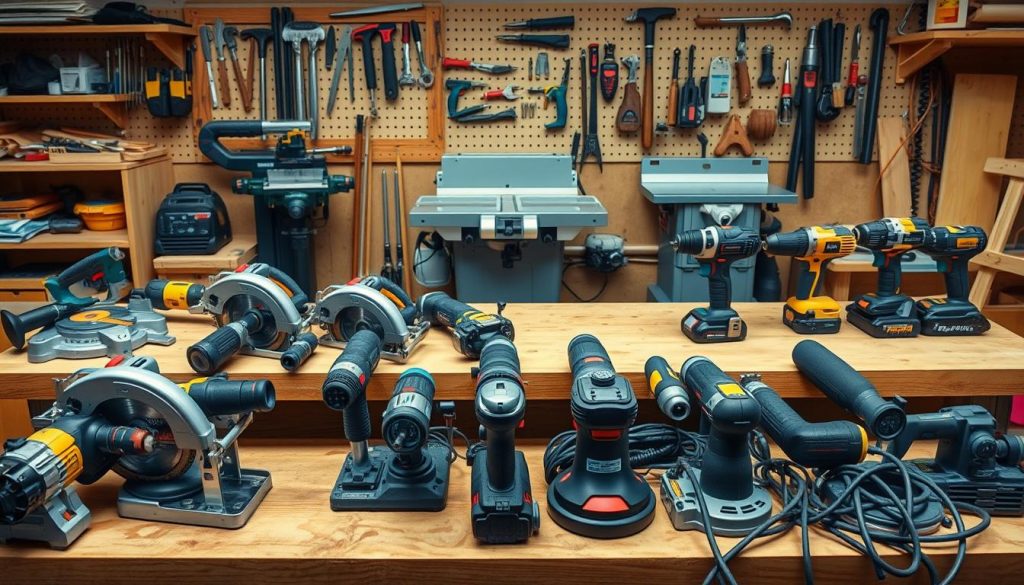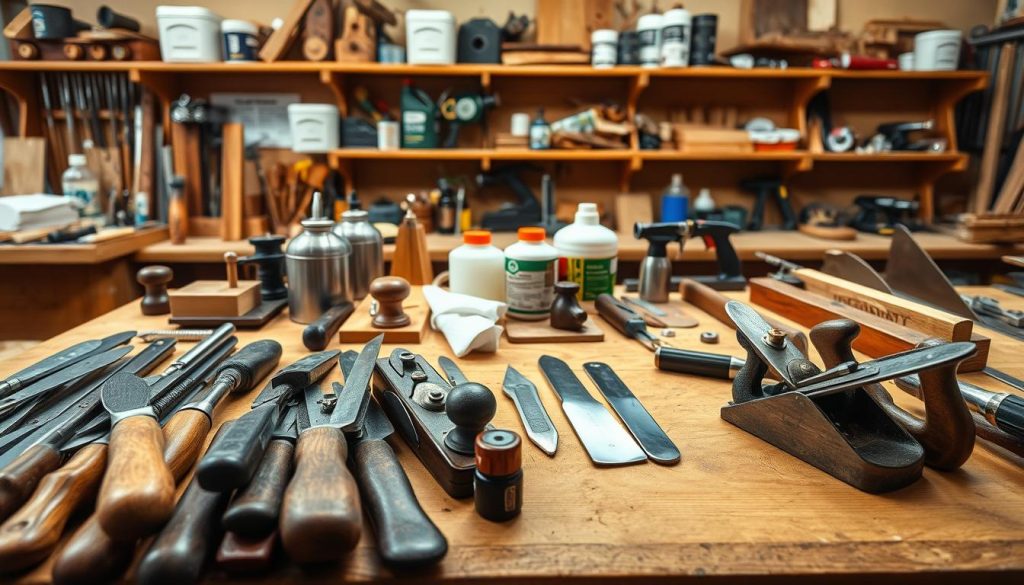Woodworking turns simple materials into amazing creations. Whether you’re a weekend hobbyist or a serious craftsman, the right tools can make a big difference. Professional woodworkers know that top-notch tools are key to great work.
Woodworking tools open up a world of creativity. You’ll find everything from precise hand tools to strong electric machines. Each tool is vital in making your woodworking dreams come true. Buying the best tools is more than just getting equipment—it’s about tapping into your creative potential.
Mastering woodworking tools takes time, effort, and love. Both newbies and seasoned woodworkers can learn a lot from each tool in their workshop.
Key Takeaways
- Quality tools are essential for successful woodworking projects
- Different tools serve unique purposes in crafting
- Woodworking requires continuous learning and skill development
- Invest in versatile and reliable woodworking tools
- Safety and proper technique are as important as the tools themselves
Essential Hand Tools Every Woodworker Needs
Woodworking is an art that needs precision, skill, and the right tools. Every craftsman knows that quality tools can make a big difference. Let’s look at the basic hand tools that will improve your woodworking skills.
Saws: Precision Cutting Companions
Choosing the right saw is key for any woodworking project. Different saws have different uses in your workshop:
- Handsaw: Perfect for basic cutting and rough work
- Backsaw: Ideal for precise, straight cuts
- Coping saw: Great for intricate curved cuts
- Japanese pull saw: Offers exceptional accuracy and control
Chisels: Sculpting Wood with Precision
Chisels are the sculptors of woodworking. They help woodworkers create detailed joints, clean out waste, and shape intricate designs. When picking chisels, think about:
- Material quality of the blade
- Handle comfort
- Blade width variations
- Edge retention capabilities
Hand Planes: Achieving Smooth Perfection
Hand planes are key for smooth, flat surfaces. These tools let craftsmen fine-tune wood surfaces, removing imperfections and preparing pieces for finishing. A well-tuned hand plane can turn rough lumber into a silky-smooth masterpiece.
Power Tools for Efficient Work
Woodworking power tools are key to turning raw materials into top-notch projects. They boost precision, speed, and craftsmanship in your workshop. Both pros and hobbyists use these tools to make their ideas real.

Choosing the right power tools is crucial. The right tools help you work smarter, not harder. This reduces strain and boosts your project’s quality.
Table Saws: The Backbone of Woodworking
Table saws are the most important tool in woodworking. They offer:
- Precise straight cuts
- Multiple cutting angles
- Consistent material sizing
- Versatility across different wood types
Routers: Versatility in Edge Work
Routers are super flexible in woodworking. They can:
- Create intricate edge designs
- Cut decorative grooves
- Shape complex joinery
- Produce professional-grade finishes
Sanders: Creating a Smooth Finish
No project is done without sanding. Top tools like orbital and belt sanders help you get:
- Ultra-smooth surface textures
- Consistent material preparation
- Professional-looking final products
- Rapid material refinement
Safety Gear and Precautions in Woodworking
Woodworking is a fun craft that needs careful safety. Professional woodworkers know safety is as important as the project. Always put safety first when using woodworking tools.
Every tool set has risks. Knowing and using safety steps can stop serious injuries. This makes your workspace safe.
Eye Protection: Choosing the Right Safety Glasses
Keeping your eyes safe is key in woodworking. Wood chips, dust, and debris can harm your eyes. Look for these in safety glasses:
- Impact-resistant lenses
- Full coverage around the eyes
- Anti-fog coating
- Comfortable fit for long wear
Ear Protection: Understanding Noise Levels
Woodworking tools can be very loud. This can hurt your hearing over time. Here are ways to protect your ears:
- Foam earplugs
- Over-ear protective headphones
- Custom-molded ear protection
Dust Masks: Importance in Respiratory Safety
Wood dust can harm your lungs. A good dust mask is key when using tools. Look for masks that:
- Filter fine particles
- Provide a tight seal
- Make breathing easy
Getting the right safety gear is worth it. It keeps you healthy and lets you enjoy woodworking for years.
Tool Maintenance Tips for Longevity
Keeping your woodworking tools in great shape is key. It’s not just about cleaning. It’s about taking care of your investment and making sure your tools work their best.

A good woodworking tool kit needs regular care to stay top-notch. If you ignore your tools, they can rust, get dull, and lose their precision.
Cleaning Your Tools Properly
Cleaning your tools regularly is a must. Here’s how to do it right:
- Remove sawdust and wood chips after each use
- Use soft brushes or compressed air for delicate areas
- Wipe metal surfaces with a clean, dry cloth
- Apply light machine oil to prevent rust on metal components
Sharpening Blades: Techniques and Tools
Sharp blades are vital for precise woodworking. You’ll need quality sharpening tools like:
- Whetstones of varying grits
- Honing guides
- Diamond stones
- Blade sharpening systems
Storing Tools Safely and Securely
Storing your tools right keeps them safe from damage and the environment. Use toolboxes, pegboards, and protective cases to keep them organized and in great shape.
By following these maintenance tips, you’ll make your woodworking tools last longer. And they’ll keep performing at their best for years.
Specialty Tools for Advanced Woodworking Projects
Woodworkers who move beyond basic skills need special tools for complex projects. These tools help make your work more precise and detailed. They allow you to create intricate designs with high accuracy.
Looking into specialty woodworking supplies can boost your project’s quality and precision. Professional woodworkers know that the right tools are key to their success.
Mortisers: Precision in Joinery
Mortisers are tools that make square or rectangular holes in wood with great accuracy. These machines are crucial for making perfect joints in furniture, cabinets, and detailed projects.
- Create precise rectangular cuts
- Essential for making strong furniture joints
- Available in bench-top and floor models
Biscuit Joiners: Enhancing Wood Joints
Biscuit joiners are tools that change the game for connecting wood pieces. They use small, football-shaped wooden biscuits to make strong, aligned connections between wood surfaces.
- Provide alignment and strength
- Work well with various wood types
- Perfect for cabinet and furniture construction
Laser Levels: Accuracy in Measurement
Laser levels are a big step forward in woodworking precision. These tools project straight lines, ensuring perfect alignment in complex projects. They are great for everything from shelving to detailed furniture designs.
- Project precise horizontal and vertical lines
- Reduce measurement errors
- Support complex woodworking layouts
Using these specialty woodworking tools can greatly improve your project quality. It also expands your technical skills.
Budget-Friendly Woodworking Tools for Beginners
Starting your woodworking journey doesn’t need to cost a lot. You can build a great tool set without spending too much. Beginners can make amazing projects with affordable, versatile tools.
Building a woodworking toolkit requires smart choices. Your first tools should be useful and flexible.
Affordable Hand Tools: A Starter Kit
Every beginner needs basic hand tools. Here are some affordable essentials:
- Claw hammer (16 oz)
- Combination square
- Tape measure
- Chisels set (basic sizes)
- Hand saw
Low-Cost Power Tools That Don’t Compromise Quality
Power tools can help you do more in woodworking. Look for entry-level models from trusted brands:
- Cordless drill driver
- Orbital sander
- Jigsaw
- Circular saw
Secondhand Tools: What to Look For
Buying used tools can save you money. Look for tools with:
- Minimal rust or wear
- Functioning moving parts
- Clean blade or cutting surfaces
- Reasonable price compared to new tools
Quality is more important than quantity. Start small, choose wisely, and grow your tool set as you improve.
Woodworking Tool Brands to Trust
Choosing the right woodworking tools is key for DIY projects. Professional woodworkers know that trusted brands offer quality and performance. These tools are essential for any woodworking project.
Many brands are known for their quality and innovation in woodworking tools:
- DeWalt: Known for robust power tools and professional-grade equipment
- Milwaukee: Offers high-performance cordless tools with excellent battery life
- Makita: Recognized for precision and reliability in woodworking tools
- Bosch: Provides advanced technology and engineering in woodworking equipment
- Ridgid: Popular for professional-level durability and comprehensive warranties
Reviews of Popular Brands
Each brand has its own strengths. DeWalt is great for construction tools. Makita is known for its comfort during long work sessions. Milwaukee leads with its battery technology for long hours.
Comparing Quality vs. Price
Buying top woodworking tools doesn’t mean you have to spend a lot. There are affordable options that still offer great performance. Brands like Ryobi and Craftsman offer good tools at lower prices.
Customer Favorites in the DIY Community
Woodworking fans often suggest brands that are reliable and offer value. Online forums and reviews often praise DeWalt, Makita, and Milwaukee. These brands are favorites among both pros and hobbyists.
Space-Saving Tips for Small Workshops
Woodworking fans often face the challenge of limited space. You don’t need a huge area to create an efficient workshop. Just use smart planning and creative solutions for your tools.
Start by organizing your workshop wisely. Vertical storage is a lifesaver when space is tight. Use wall-mounted systems and pegboards to turn unused walls into useful storage.
Organizing Your Tools Efficiently
- Install wall-mounted tool racks
- Use magnetic strips for metal tools
- Implement drawer dividers for small components
- Create overhead storage for less-frequently used equipment
Workbench Design Ideas
A compact workbench can change your small workshop game. Look for designs that fold against the wall or have built-in storage. Workbenches with tool storage save space and keep tools handy.
Mobile Tool Storage Solutions
- Rolling tool cabinets with lockable wheels
- Modular storage systems
- Portable tool chests
- Collapsible workstations
With careful planning, even the smallest workshop can be a productive woodworking space. Remember, good organization is crucial to using your space well.
DIY Projects to Practice Your Woodworking Skills
Woodworking is all about practice and creativity. With the right tools and supplies, beginners can turn raw materials into beautiful pieces. Starting small boosts confidence and develops key skills for your journey.
Beginners can start with simple projects to learn basic techniques. A wooden cutting board is a great first project. It teaches measuring, cutting, and finishing skills. A rustic picture frame is another good project, showing how to join wood and use precision.
Storage solutions are great for learning. Building a wooden crate or a wall-mounted shelf teaches measurement and joinery. These projects improve your skills and add useful items to your home.
Creative projects like wooden coasters, small wall hangings, or jewelry boxes let you try new designs and techniques. Each project helps you get better with tools and brings joy from creating something unique.